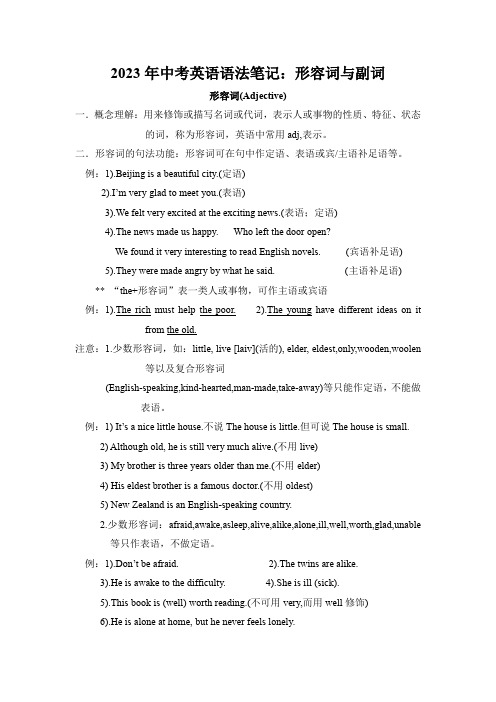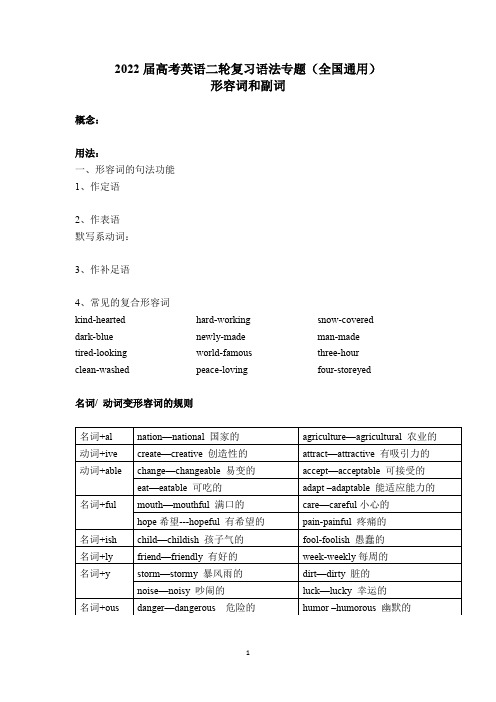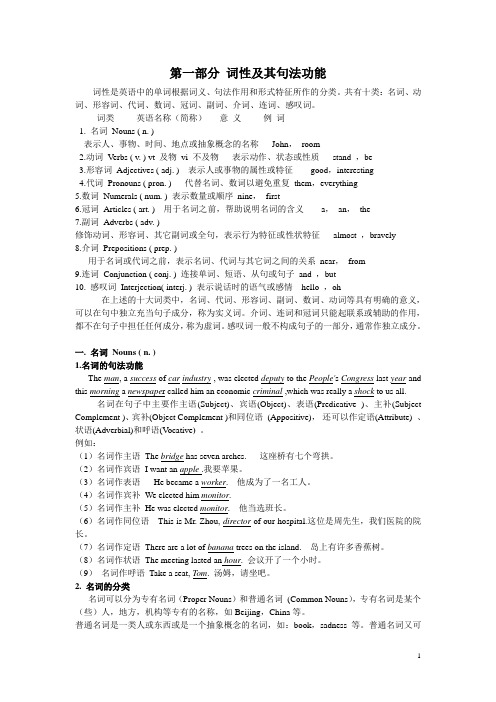英语语法:形容词的主要句法的功能
2023年中考英语语法笔记:形容词与副词

2023年中考英语语法笔记:形容词与副词形容词(Adjective)一.概念理解:用来修饰或描写名词或代词,表示人或事物的性质、特征、状态的词,称为形容词,英语中常用adj,表示。
二.形容词的句法功能:形容词可在句中作定语、表语或宾/主语补足语等。
例:1).Beijing is a beautiful city.(定语)2).I’m very glad to meet you.(表语)3).We felt very excited at the exciting news.(表语;定语)4).The news made us happy. Who left the door open?We found it very interesting to read English novels. (宾语补足语)5).They were made angry by what he said. (主语补足语)** “the+形容词”表一类人或事物,可作主语或宾语例:1).The rich must help the poor. 2).The young have different ideas on it from the old.注意:1.少数形容词,如:little, live [laiv](活的), elder, eldest,only,wooden,woolen 等以及复合形容词(English-speaking,kind-hearted,man-made,take-away)等只能作定语,不能做表语。
例:1) It’s a nice little house.不说The house is little.但可说The house is small.2) Although old, he is still very much alive.(不用live)3) My brother is three years older than me.(不用elder)4) His eldest brother is a famous doctor.(不用oldest)5) New Zealand is an English-speaking country.2.少数形容词:afraid,awake,asleep,alive,alike,alone,ill,well,worth,glad,unable等只作表语,不做定语。
语法专题 形容词副词讲义(全国通用) 2022届高考英语二轮复习

2022届高考英语二轮复习语法专题(全国通用)形容词和副词概念:用法:一、形容词的句法功能1、作定语2、作表语默写系动词:3、作补足语4、常见的复合形容词kind-hearted dark-blue tired-looking clean-washed hard-workingnewly-madeworld-famouspeace-lovingsnow-coveredman-madethree-hourfour-storeyed名词/ 动词变形容词的规则名词+al nation—national 国家的agriculture—agricultural 农业的动词+ive create—creative 创造性的attract—attractive 有吸引力的动词+able change—changeable 易变的accept—acceptable 可接受的eat—eatable 可吃的adapt –adaptable 能适应能力的名词+ful mouth—mouthful 满口的care—careful小心的hope希望---hopeful 有希望的pain-painful 疼痛的名词+ish child—childish 孩子气的fool-foolish 愚蠢的名词+ly friend—friendly 有好的week-weekly每周的名词+y storm—stormy 暴风雨的dirt—dirty 脏的noise—noisy 吵闹的luck—lucky 幸运的名词+ous danger—dangerous 危险的humor –humorous 幽默的二、副词的句法功能作状语三、易混淆的词1、hard—hardly例:He works hard. He hardly smokes.2、late—lately —later — latest例:She always come back late.Lately, I have had trouble sleeping.She came back 3 days later.I got the latest album of Jay.3、-ly结尾的形容词friendly , lovely, lonely, lively, deadly(致命的),elderly (年龄较大的),yearly, monthly, daily, weekly,be likely to (可能做某事)四、常考的几组副词用法:1、though意为:2、besides意为:3、however意为4、therefore意为:5、instead 意为:6、ago和beforeA、ago一般用于B、beforeadj. 变adv.的规则slow—slowly 缓慢地exact—exactly 精确地natural—naturally 自然地obvious—obviously 显然地happy-happily angry—angrilynoisy--noisilyterrible—terribly 糟糕地gentle --gently 温柔地possible—possibly 可能地simple – simply 简单地comfortable ---comfortably 舒适地probable—probably 可能地fortunate—fortunately 幸运地polite –politely 礼貌地rude—rudely 粗鲁地complete—completely 完全地特殊:true—truly真实地energetic –energetically 有活力地basic—basically 基本上automatic—automatically 自动地scientific—scientifically 科学地原级比较级最高级第一类tall taller tallest第二类largenice largernicerlargestnicest第三类easyhappy easierhappiereasiesthappiest第四类(辅元辅)hotthinhotterthinnerhottestthinnest第五类importantquickly more importantmore quicklymost importantmost quickly第六类不规则good/wellbad/badly/illoldmuch/manybetterworseolder/eldermorebestworstoldest/eldestmost一、形容词/ 副词原级用法1、as..as.. 和..一样(as+形容词/ 副词原级+as) , not as..as.. 不如...2、as+形容词+a/an+可数名词单数+as二、形容词/ 副词比较级用法 1、比较级+than ,表示:更….2、比较级+and+比较级, 表示:越来越….3、the+比较级, the+比较级 表示:越…越…4、比较级前可以用_________________________________等词来修饰,表示程度。
大学英语语法(词性与句法)

第一部分词性及其句法功能词性是英语中的单词根据词义、句法作用和形式特征所作的分类。
共有十类:名词、动词、形容词、代词、数词、冠词、副词、介词、连词、感叹词。
词类英语名称(简称)意义例词1. 名词Nouns ( n. )表示人、事物、时间、地点或抽象概念的名称John,room2.动词Verbs ( v. ) vt 及物vi 不及物表示动作、状态或性质stand ,be3.形容词Adjectives ( adj. ) 表示人或事物的属性或特征good,interesting4.代词Pronouns ( pron. ) 代替名词、数词以避免重复them,everything5.数词Numerals ( num. ) 表示数量或顺序nine,first6.冠词Articles ( art. ) 用于名词之前,帮助说明名词的含义a,an,the7.副词Adverbs ( adv. )修饰动词、形容词、其它副词或全句,表示行为特征或性状特征almost ,bravely8.介词Prepositions ( prep. )用于名词或代词之前,表示名词、代词与其它词之间的关系near,from9.连词Conjunction ( conj. ) 连接单词、短语、从句或句子and ,but10. 感叹词Interjection( interj. ) 表示说话时的语气或感情hello ,oh在上述的十大词类中,名词、代词、形容词、副词、数词、动词等具有明确的意义,可以在句中独立充当句子成分,称为实义词。
介词、连词和冠词只能起联系或辅助的作用,都不在句子中担任任何成分,称为虚词。
感叹词一般不构成句子的一部分,通常作独立成分。
一. 名词Nouns ( n. )1.名词的句法功能The man, a success of car industry , was elected deputy to the People's Congress last year and this morning a newspape r called him an economic criminal,which was really a shock to us all.名词在句子中主要作主语(Subject)、宾语(Object)、表语(Predicative )、主补(Subject Complement )、宾补(Object Complement )和同位语(Appositive),还可以作定语(Attribute) 、状语(Adverbial)和呼语(V ocative)。
初中英语语法——形容词副词

A living language should be learned orally(口头上). (活的语言应该从口头上学)(被动句) We have a living hope that you will succeed. (我们强烈地希望你能成功) Is she still alive? (她还活着吗?) They are the happiest children alive. (他们是活着的最开心的孩子)
⒀ gone、lost与missing
gone表示“丢了,没了”,含一去不复返 的意思,也可以表示“死了”,作表语或 宾补,不可以作定语; lost表示“丢失”,含难以找回的意思, 可作定语、表语或宾补; missing表示“失踪了,不见了”,强调 某人物不在原处,可作定语、表语或宾补。
My fever(高烧) is gone, but I still have a cough. (发烧消退了,但我仍然咳嗽) The parents found the lost child at last. (家长终于找到了迷路的孩子) My dictionary is missing.Who’s taken it away? (我的字典不见了,谁拿走了?) For more detailed information(详情) of the missing girls, please visit our website(网址). (如果想知道失踪女孩们的 详情,请访问我们的网站)
⑿ special与especial
表示事件不同寻常、过分或特殊时,两个词可 互换,但special较为常用。另外,special还可 以表示特别的目的。 She pays (e)special attention to clothes. (她非常注重着装) These are special chairs for small children. (这些是专门给小孩子的椅子)
英语语法 形容词和副词的句法功能课件

形容词作状语主要表示原因、结果或方式,可位 于句首、句中和句末
副词作状语修饰动词、形容词、其他副词或句子
t
作原因状语 Hungry and tired, I had to stop to have a rest. 又累又饿,我只好停下来休息一下。
We arrived home very late, safe and sound.
我们回家很晚,安然无恙。
作方式状语
ห้องสมุดไป่ตู้作方式状语
They were warmly welcomed by the students.
他们受到学生们的热烈欢迎。 修饰动词
This is exactly what he said. 修饰从句
这正是他所说的。
作方式状语
Fortunately, I was in time for the interview. 幸运地是,我及时赶上了面试。 修饰从句
The beautiful is not always the same as the gootd.
漂亮的不一定就是好的。
THE END
形容词作表语通常位于系动词动词后面
be, feel, get, turn, become, prove, seem
副词作表语表示主语的方位、方向、动作或状态
t
in, out, on, back, down,
up, off, away, upstairs
While I was in New York, I felt homesick.
t
There is a red apple on the table. 桌子上有个红色的苹果。
People now often have their festival dinners at restaurants.
高中英语 高中简明语法系列---形容词副词分类与功能讲义

形容词形容词(Adjective)用来修饰名词或代词,描绘人和事物的特征。
形容词在句中一般用作定语、主语补语或宾语补语。
补语性形容词和定语性形容词根据形容词的句法功能,形容词可以分为补语性形容词和定语性形容词。
多数形容词既可以作名词的修饰语又可以作主语的补语。
1.只能作补语的形容词(1)以a-开头的形容词,如alone 单独,asleep 熟睡的,awake醒着的,alive活着的,alike 同样的,afraid 害怕,ashamed羞愧看下例:He is fast asleep in his bedroom.他在卧室熟睡。
We are fully aware of the difficulty.我们充分认识到困难。
I felt ashamed of my terrible mistake.我为自己的严重错误感到羞愧。
Paul was again absent from the meeting.鲍尔开会再次缺席。
(2)表示健康状况的形容词well 健康,ill 患病,faint 虚弱。
例如:I didn't feel well, but the doctor said it was nothing serious.我感觉不舒服,可医生说没什么要紧。
His strength grew faint as he was getting on in years.他上了年纪,体力虚弱。
(3)某些表示情感和心理状态的形容词。
例如:I'm glad of your great success in your study.我为你学习上的巨大成功感到高兴。
Shella was sorry about what she had done.希拉对自己的行为感到后悔。
My grandfather is fond of cycling.我祖父喜欢骑自行车。
He is content with his present job and position.他满足于自己的工作和地位。
形容词的初中英语语法
形容词的初中英语语法
形容词的初中英语语法
用来说明或修饰名词、代词的词称为形容词。
1、形容词的句法作用:作句子中名词的定语、句子的表语以及宾语补足语。
2、形容词在句子中的位置:
⑴作定语时放在名词的前面,且音节少的词放在音节多的词之前。
如:a big yellow wooden wheel(一个黄色的大木轮)
⑵作表语时放在连系动词之后。
如:The price sounds reasonable。
(这个价格听起来算是合理)
⑶作宾语补足语时放在宾语之后。
如:We must try our best to keep our environment clean。
(我们必须尽力保持我们的'环境清洁)
⑷后置的情况:
①修饰复合不定代词时放在代词之后。
如:Something serious has happened to him。
(他发生了严重的事故)
②与表示“长、宽、高、重、老、远离”的词连用时形容词后置。
如:He’s 1。
8 metres tall。
(他身高1。
8米。
)The moon is about 380,000 kilometres away from the earth。
(月球离地38万公里)。
初中英语语法之形容词与副词的基本用法讲义(含部分答案)
教学内容形容词和副词知识结构形容词一、形容词的定义形容词是描述人或事物的特征、性质、属性及状态的一种词类,主要用来修饰名词或代词。
二、形容词的句法功能成分说明例句作定语一般放在所修饰词的前面It’s a cold and windy day today. 今天是个寒冷、有风的天气。
1)表示发生时间的副词:►It’s beginning to rain now! 现在开始下雨了!2)表示频繁程度的副词,也称频度副词always, often, usually, sometimes, never, ever, hardly等一般位于系动词、情态动词和助动词之后,实义动词之前。
►She often changes her mind. 她常改变主意。
3)还有一些其他表示时间的副词:►He has just had an operation. 他刚动过手术。
2. 地点副词:here, there, out, somewhere, abroad, home1)有不少表示地点的副词:►She is studying abroad. 她在国外留学。
2)还有一些部分与介词同形的副词。
它们与介词同形,后跟宾语的是介词,否则是副词:①用作介词:Stand up!起立!①用作副词:A cat climbed up the tree. 猫爬上了树。
3)以where构成的副词也是地点副词:It’s the same everywhere. 到处都一样。
3. 方式副词:well, fast, slowly, carefully, quickly1)英语中有大量方式副词,说明行为方式(回答how的问题):►How beautifully your wife dances. 你夫人舞跳得真美。
2)还有相当多的副词,表示某些情绪:►She smiled gratefully. 她感激的笑了笑。
3)还有一些以-ly结尾的副词,表示动作发生的状况:►He left the town secretly. 他悄然离开了这座城市。
英语语法详解:形容词的用法总结
英语语法详解:形容词的用法总结形容词修饰名词,说明事物或人的性质或特征,英语中的形容词体系浩如烟海,里面学问很大,掌握形容词的运用对学习英语有很大的意义,今天就为大家整理了形容词的主要用法及其在句子中的位置,吧!一、什么是形容词?形容词是用来形容名词及部分代词,表示人或者事务性质,状态和特征的词,这类词叫形容词。
例如下面的句子:NO.1 She is a beautiful girl.她是一个漂亮的女孩。
beautiful 修饰名词girl。
NO.2 This is a good boy.这个一个好孩子。
good 修饰名词boy。
NO.3 Let me tell you something interesting.让我告诉你一件有趣的事情。
二、句法功能1、形容词修饰名词/不定代词,说明事物或人的性质或特征。
一般放所修饰名词前作定语,也可独立作表语/宾补等(1)作定语:①Thisis an interesting story. ②Kitty is aclever cat.(2)作表语:①Yao Ming is verytall. ②Our classroom is bigand bright.(3)作宾补:①Don't make your hands dirty. ②We're trying to make our school beautiful.2、可将形容词分成性质形容词+叙述形容词,不一定都放在名词前面。
(1)直接说明事物的性质或特征的形容词是性质形容词,它有级的变化,可以用程度副词修饰,在句中可作定语、表语和补语。
例如:hot 热的。
(2)叙述形容词只能作表语,所以又称为表语形容词。
这类形容词没有级的变化,也不可用程度副词修饰。
大多数以a开头的形容词都属于这一类。
例如:afraid 害怕的。
(错)He is an ill man. (对)The man is ill. (错)Sheis an afraid girl. (对)The girl is afraid.这类词还有:well,unwell,ill,faint,afraid,alike,alive,alone,asleep,awake 等。
英语的句法和词法6 -----形容词和副词
英语的词法-6 & 7 -------形容词&副词形容词用来修饰名词或代词,表示人或事物的性质、状态,和特征的程度好坏,与否。
形容词作定语修饰名词时,要放在名词的前边。
但是如果形容词修饰以-thing(复合不定代词)为字尾的词语时,要放在这些词之后,例如:something nice1.用形容词表示类别和整体某些形容词加上定冠词可以泛指一类人,与谓语动词的复数连接。
如:the dead,the living,the rich,the poor,the blind,the hungry2. 以-ly结尾的形容词(1)friendly,deadly,lovely,lonely,likely,lively,ugly,brotherly,仍为形容词。
(2)有些以-ly 结尾既为形容词,也为副词。
daily,weekly,monthly,yearly,earlyThe Times is a daily paper. The Times is published daily.(2) 不规则变化考点:原级比较: 两个比较对象程度相同,用as…as结构,中间加副词原形,如果是否定,再前面加上否定词not so…as。
比如:She plays the piano as well as I.她弹钢琴和我弹得一样好。
Keeping a diary in English is not so difficult as some students image.每天写英语日记对于学生来说也并不是一件难事。
比较级:两个相比,A比B强,就用比较级,通常用“…比较级+than”的结构。
比如:She sings better than her sister.她比她妹妹唱得好。
你认为艺术和音乐一样重要吗?还有两个结构很常用,一个是“越来越”more+and+more;一个是“越…,越…”,the more…,the more。
- 1、下载文档前请自行甄别文档内容的完整性,平台不提供额外的编辑、内容补充、找答案等附加服务。
- 2、"仅部分预览"的文档,不可在线预览部分如存在完整性等问题,可反馈申请退款(可完整预览的文档不适用该条件!)。
- 3、如文档侵犯您的权益,请联系客服反馈,我们会尽快为您处理(人工客服工作时间:9:00-18:30)。
英语语法:形容词的主要句法的功能
形容词的主要句法功能
1. 用作表语
Everyone was happy. 每个人都很高兴。
He is interested in watching TV. 他对看电视感兴趣。
2. 用作定语
He is an honest student. 他是个诚实的学生。
The young man is her boy friend. 这个小伙子是她的男朋友。
3. 用作宾语补足语
He pushed the door open. 他把门推开了。
We found the problem very difficult. 我们发现这个问题很难。
【注】这类句型若变为被动语态,形容词则为主语补足语:
The problem was found very difficult.
4. 用作状语
He arrived home, hungry and tired. 他回到家里,又饿又累。
I went there full of joy. 我兴高采烈地去了那儿。
He sat in the corner, silent. 他坐在角落里,一言不发。
形容词用作状语主要表示原因、结果或伴随等,其逻辑主语必须
与句子主语保持一致。
这类结构通常可用从句或并列句来改写:
He came over, eager to help. / He came over and (he) was eager to help. 他走过来,急于想帮忙。
【注】以上形容词用作状语的情形,有人也称之为主语补足语,
因为它们是补充说明主语的。
另外,还有一类特殊的形容词用作状语:
The stove was red hot. 火炉是炽热的。
It’s boiling hot. 它是滚烫的。
His face was bright red. 他的脸是鲜红的。
The weather is freezing [icy, bitter] cold. 天气冷极了。
其中的red, boiling, freezing, icy, bitter 等的实际意义大致相当于very,起增强语气的作用,并且它们用法也很有限,如可说bitter cold(冰冷),bitter wind(寒风)等,习惯上却不说 bitter
hot(炽热),bitter busy(极忙)等。
5. 用作独立成分
Strange to say, he married such a girl. 说来也怪,他娶了
那样个女孩子。
Sure enough, he got angry at the news. 果然,他对这个消
息很生气。
Worse still, we got lost in the dark. 更糟的是,我们在黑
暗中又迷路了。
